9 Types of Water Heaters for Every Family Size & Budget
Author: Rick Worst | Editor: Omar Alonso
Review & Research: Jen Worst & Chris Miller
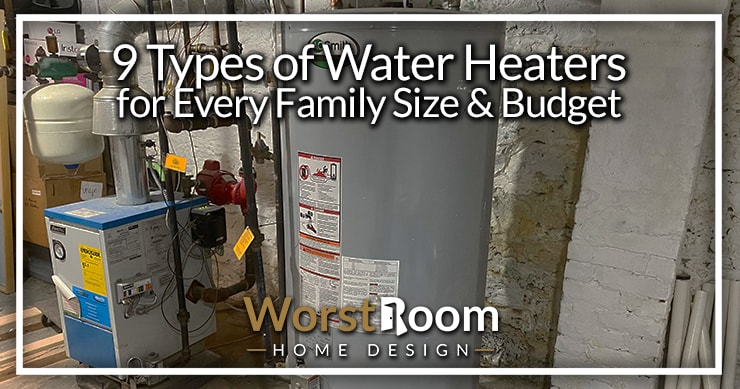
If you’re the type that loves your hot showers after long, tiring days, then it's time to learn about the various types of water heaters, probably the most hardworking device in your house.
But you can be forgiven for not knowing a thing about heaters—after all, you’ll probably purchase one or two, at the most, in your entire lifetime. But what if your water heater breaks down after all those years of faithful service and you need to get a new one?
Well, that’s when it becomes necessary to know the different types of water heaters out there. Knowing this will help you pick out one that’s both cost and energy efficient, the latter an extremely important requirement if you like your electricity bills low.
9 Types of Water Heaters
If solar, electric, on-demand, storage-tank, gas, conventional, and tankless water heaters have you scratching your head in confusion, let us take you through the different water heater types out there.
Tankless Water Heater

Tankless water heaters, as the name suggests, don’t have a tank where the water gets heated. Instead, there are coils that get super-hot when filled with water, giving you instantaneous results.
Tankless heaters are among the most efficient, heating large amounts of water quickly. With these in the picture, an endless supply of hot water, on demand, is a reality. No more finding yourself in a cold shower on a cold day, no matter what types of showers you have in your home.
Tankless heaters come in different sizes and you should pick the size you need based on your needs and if you live with family, the needs of your family, too. You should familiarize yourself with how a tankless water heater works if you plan on having one.
Choosing a size smaller than required will result in lukewarm or cold water since you’re placing more demand on your heater than it can take. The design of these makes it more obvious that you can use water if your water heater is off, though tank water heaters tend to confuse people. What's nice is you don't have to deal with the water heater not filling up.
Tankless heaters can run on both gas and electricity; the smaller ones generally run on the former and larger ones on the latter—your energy needs will vary depending on the size and source of power of your heater.
Conventional Storage Tank Water Heater
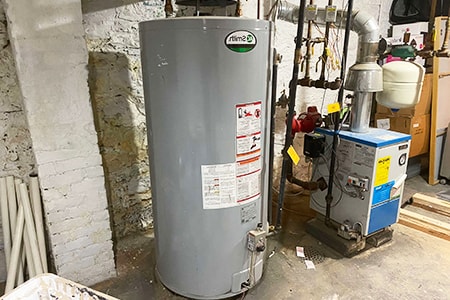
The first types of water heaters to hit the market, conventional or traditional storage-tank water heaters are the most common types of heaters out there and most probably the one you’re currently using at home, too.
As the name suggests, water heaters with tanks feature a storage tank of a specified capacity, where the water remains as it gets heated. Ergo, the amount of hot water available in one go is directly correlated to the size of the heater’s tank, which makes buying the right size paramount.
To ensure that the water remains warm after heating (even if you’ve switched it off), these tanks feature excellent insulation. You just want to be careful not to lay the water heater on its side during transport.
You may be wondering how water heaters work. Traditional heaters feature two valves—one for temperature control and one for pressure control. The former opens only when there is a need to release heat or moderate temperatures after the water hits 120 degrees Fahrenheit, while the latter opens around 150 PSI to reduce pressure.
The major throw-off with these heaters is that they take their time heating your water and if you’ve used up all the heated water and need more, you’ll wait for another round of heating to happen (this could be an hour, with 50-gallon heaters) before the water is available. You can end up with issues like the pilot light going out, the classic thermopile voltage low issue, etc.
Therefore, only a fixed amount of water is available at any given point. However, these types of hot water heaters are supremely affordable and simple to install and use. They also age, cause sediment to move into your pipes, and can even cause your toilet water to turn brown!
Heat Pump Water Heater
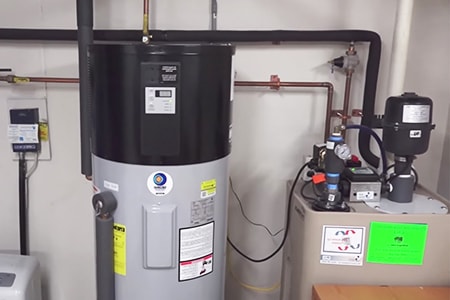
Also known as hybrid electric water heaters, these heaters can save you tons on your electricity bill since their mode of heating doesn’t involve direct heat generation—ergo, lower power consumption!
Instead, these heaters capture heat from the air or ground and transfer this heat to the water they’re heating. Therefore, the electricity only kicks in when the heat is being transferred from the source (ground or air, in this case) to the water tank.
As you’ve figured, this negates the heater’s need to depend completely on electricity, unlike others. In figures, this means that a heat pump water heater uses up 60% less energy when pitted against conventional water heaters.
The downside, though? The heat pump needs to be placed on top of the water heater, meaning that you’ll need at least 8 feet from floor to ceiling to accommodate this.
Additionally, since it depends on external sources for heat, the heat pump water heater may not be the wisest choice for cold places, whether this is Iceland or your basement.
And given how expensive these hot water heater types are, it may take quite a few years before the savings on your electricity bill even begin to cover your investment in the heater.
Condensing Water Heater
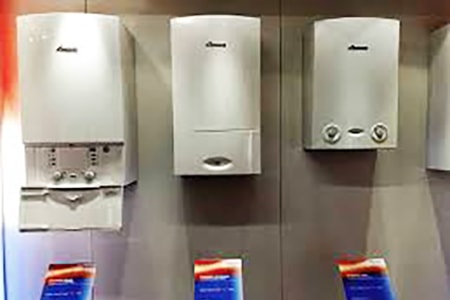
Another energy-efficient water heater, condensing water heaters, also known as condensing boilers, run on gas, capturing and using the extra fumes to heat water.
They extract heat from the hot exhaust gas expelled through the flue, store it, and use the heat from the gas to pre-heat the water in the boiler.
Condensing water heaters feature storage tanks just as conventional heaters do. The flue gas captured by these heaters is blown through the coil, placed at the heater’s base (the placement also works to heat incoming water).
These heaters are a good option for those that require around 55 gallons of hot water in one go. If your household runs on natural gas, a condensing water heater will turn out to be supremely energy efficient.
You’ll have plenty of hot water, so there’s no fear of running out of hot water mid-shampoo, either. Apart from the natural-gas exclusivity and unavailability in small sizes, these water heater systems have everything going for them.
Solar-Powered Water Heater
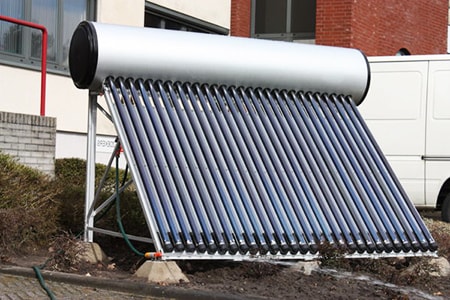
One of our favorites for how eco-friendly and energy efficient they are, solar-powered heaters depend on good old sunlight for their energy.
Therefore, if you’re one of those folks who recognize that alternative energy is the need of the hour and either have or will add solar panels to your house, there’s nothing like a solar-powered water heater for your hot water needs.
The heat captured by the cells of the solar panel is transferred through the heat-conductive material in the closed-loop system, which eventually reaches the tank and heats the water.
Due to its dependence on sunlight, this type of heater is an excellent idea only for those living in sunny areas. These hot water heater options can save such folks large amounts on electricity bills.
But even sunny areas don’t have sunlight 365 days a year, which means a back up alternative source of energy will still be required for those rainy days, such as natural gas or electricity. However, the reduction in the carbon footprint the rest of the year is quite worth it.
Energy efficient (80% of the sunlight is converted into energy), cost efficient, unlimited hot water on sunny days, environmentally friendly (due to which the governments of some countries even provide financial incentives, tax credits and utility rebates to folks who use these)—there’s very little margin for error with these heaters!
That said, these types of water heaters can be quite expensive in some parts of the world and as mentioned, don’t work too well on rainy days. Additionally, maintaining the various parts can be a little bit of a hassle.
Combined Space & Water Heating System
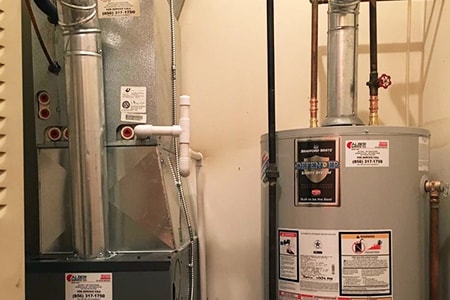
Combined space and water heating systems come with or without hydronic boilers. Essentially, these are a great replacement to forced-air furnaces, using an optimized hydronic air handler with large coils for heat transfer and therefore, space heating.
These heaters are great for houses that don’t have high heating needs, providing more insulation, space efficiency, and lowered leakage of air. A single unit will suffice, saving energy and space.
With these heaters, it’s a literal win-win—both your space and water are heated, though its efficiency in heating one need not necessarily reflect on its efficiency of heating the other. You’re also saving quite a bit of money and energy.
Ensure you buy the right size for your needs. Due to its novelty, though, you may have a hard time finding an electrician who can install these water heater systems right.
With Hydronic Boilers
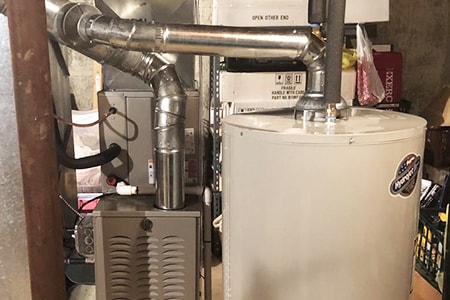
Also known as segregated heating systems or combi-boilers, these heaters have hydronic boilers, with heat transfer happening through a heat exchanger. These come with and without tanks.
The flow control valve ensures a constant temperature, regardless of the temperature of the incoming water. Therefore, you have a decent amount of hot water at stable temperatures.
The good thing about these heaters is that they last between 10 and 15 years with good care. The compact design with built-in parts means that you don’t have to purchase parts separately.
The compact size is also a great size saver, as water supply comes directly from the mains, negating the need for a tank. You aren't likely to deal with water leakages and growing mushrooms in your basement by accident.
You’ll also end up saving around 90% of your monthly bill! However, as mentioned, installation can be a pain, further compounded by the complexity of the heater—you don’t want to spend what you save on your bill by way of repairs.
The time taken to heat is also longer, since there’s no tank—therefore, not a good option for large households. But these types of water heaters can save some serious money over time.
Point of Use Water Heater
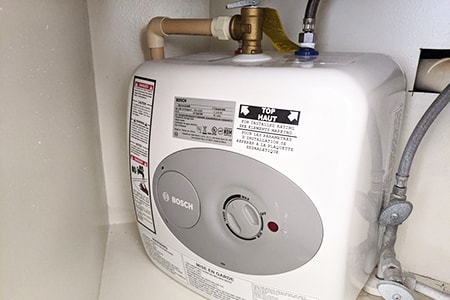
These are small heaters installed near the supply fixtures. Point-of-use heaters supply water away from the central heating unit and can be with or without tanks.
These water heater types are also great as back ups when the primary heater depends on gas or electricity, but not solar power.
These heaters let you save energy by letting you decrease the temperature setting on a central tank water heater and are very popular companions to many types of hot tubs, guest bathrooms and fixtures that use less than 20 gallons of hot water per day.
Smart Water Heater
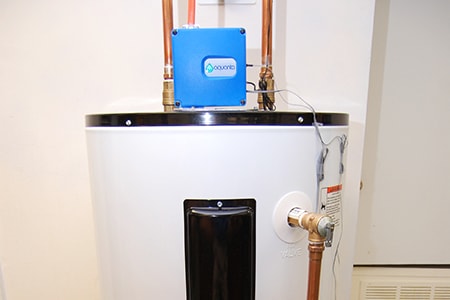
Smart water heaters can be a thermostat or a tankless system, working in collaboration with your existing heater.
These systems even let you connect to Wi-Fi, save energy by monitoring and adjusting temperature, minimize water damage through leak detection and kill bacteria inside the water heater by cycling water temperatures, and some can even act as water softener alternatives.
However, these types of hot water heaters are expensive and require professional installation.
Which Types of Water Heaters are Best for You?
Whether you’re looking for an energy-efficient heater or one that gives you an uninterrupted flow of hot water or one that’s relatively inexpensive, there’s a water heater out there to satisfy your needs.
Knowing the types of water heaters will help you pick out the right one for your needs—with our primer, you’ll never again face confusion between a condensed heater and a combi heater!



